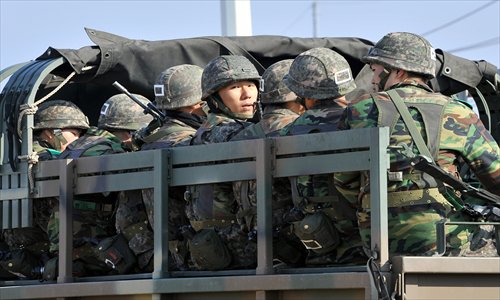S.Korea, US raise alert status amid missile launch fears

South Korea and the US on Wednesday upgraded their surveillance status ahead of an expected missile launch threatened by North Korea in preparation for a key celebration on Monday.
Though Pyongyang's continuing bellicose rhetoric has been downplayed as "psychological warfare," analysts believe the nuclear state is very likely to take some actions in the near future as tensions on the Korean Peninsula are pushed to the brink.
South Korean Foreign Minister Yun Byung-se told a parliamentary hearing Wednesday that based on the intelligence obtained by Seoul and Washington, the possibility of a missile launch by North Korea is "very high," which could come "at any time," the Yonhap news agency reported.
Yun confirmed that North Korea has moved a mid-range Musudan ballistic missile to its east coast.
"The Musudan missile has a range of 3,500 kilometers and it's up to North Korea how far it would fly," said Yun, adding that the missile could hit the US territory of Guam.
North Korea last week told foreign embassies to leave the country before Wednesday. It released the same warning on Tuesday to expatriates in Seoul with a "thermonuclear war" threat.
In response to an imminent test, the Combined Forces Command raised "Watchcon" 3 status, a normal defense condition, to "Watchcon" 2 and increased the number of intelligence staff, Yonhap reported.
But no missile was launched on Wednesday, and according to media reports, people were living and working normally and the nation is immersed in preparing for the upcoming birthday celebrations for the country's late founder Kim Il-sung.
"Though North Korea didn't launch the missile today as many had expected, it doesn't mean it has abandoned the plan," said Cui Zhiying, director of the Center for Asia-Pacific Studies at the Tongji University, noting that it may conduct the test at the celebration as it did last year when it test-fired a rocket to celebrate the 100th anniversary of Kim Il-sung's birthday.
Jin Qiangyi, director of the Asia Research Center at Yanbian University, echoed Cui's view, saying that since North Korea has pushed itself to a situation with no retreat, it will have to take some actions, but there is a slim possibility of a full-scale war unless it crosses the bottom line of the US.
China on Wednesday reiterated its stance on the Korean Peninsula situation, urging all concerned parties to strive for the resumption of the Six-Party Talks.
As for appeals from South Korea and the US to China to further pressure North Korea, Chinese foreign ministry spokesman Hong Lei said, "It's a common obligation to maintain the peace and stability of Korean Peninsula and push forward its denuclearization."
Thursday marks the one-year anniversary of Kim Jong-un becoming the head of the country's ruling Party. Jin said though the international community had high hopes of the young leader improving people's livelihoods through economic building, the status quo is "disappointing."
"The country is becoming increasingly isolated and it is difficult for it to make remarkable changes in its economy," Jin told the Global Times.
He further explained that North Korea has become stuck in a dilemma — its own economic system has almost collapsed and it has to rely on other countries to develop its economy, but its ongoing provocations will only worsen its relations with the outside.
US Secretary of State John Kerry is scheduled to visit South Korea and hold talks with Yun. Jin said the two sides might hold further discussions if there are any more effective options other than sanctions to punish the country.
The South Korean government on Wednesday also announced that North Korea was behind the massive hacking attack that paralyzed the networks of several financial firms and broadcasters last month.
Separately, travel agencies in Yanbian, Northeast China's Jilin Province were asked to suspend tours to North Korea starting Wednesday in the wake of the tension, China Central Television reported.
Agencies contributed to this story